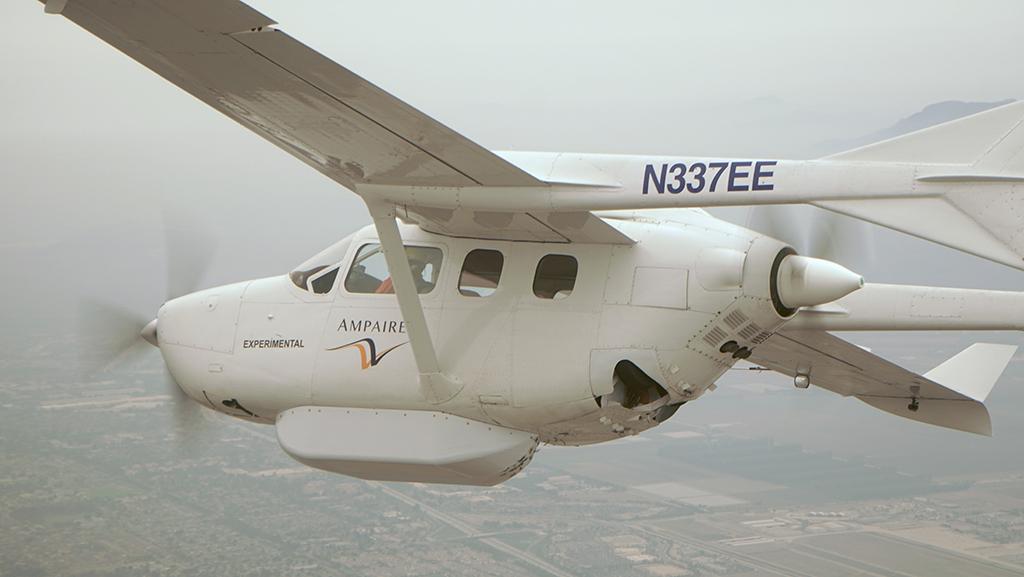Surf Air’s Ampaire Acquisition Could Speed Up Hybrid-Electric Aviation

Hybrid-electric power train developer Ampaire is being acquired by Surf Air Mobility, a company focused on providing an alternative to driving or flying on commercial airlines for trips of 50-500 mi.
Surf Air Mobility was formed in 2020 when Surf Air, which provides scheduled short-haul flights for a monthly membership fee, purchased BlackBird, an aviation marketplace that enables passengers to charter flights on private aircraft. Surf Air Mobility subsequently secured a $200 million investment commitment from Luxembourg-based Global Emerging Markets Group in a deal to go public.
- Ampaire is targeting upgrades for 9-19-seaters
- Surf Air plans to deploy across regional fleets
Through Surf Air and BlackBird, the company has access to a fleet of turboprop commuter and general aviation aircraft. Acquiring Ampaire will enable Surf Air Mobility to improve the affordability, accessibility and environmental footprint of regional travel, the company says.
“We see the near-term opportunity to transform existing turboprop aircraft across the entire industry as the first step to ultimately extend to fully electric aviation across all trip lengths,” says Surf Air Mobility co-founder and CEO Sudhin Shahani.
Ampaire is developing hybrid-electric power trains for retrofit into 9-19-seat piston and turboprop aircraft. The startup is flying two propulsion testbeds modified from the Cessna 337 Skymaster, with a battery-powered electric motor replacing one of the two piston engines.
With funding support from NASA, Ampaire is now developing a megawatt-class, hybrid-electric propulsion conversion for the 19-seat twin-turboprop de Havilland Canada DHC-6 Twin Otter. This is planned as the startup’s first commercial offering.
“The same building blocks of the electrified power train from the Twin Otter can be applied to other turboprops in the Part 23 category, for example the Cessna Caravan. We’ll continue working on both,” says Ampaire co-founder and CEO Kevin Noertker.
Beyond using Ampaire’s technology on its own fleet, he says, Surf Air Mobility intends to make hybrid-electric power train upgrades available to fleet operators—on and off its BlackBird platform—as well as license the technology to original equipment manufacturers for new aircraft.
With the reduced direct operating costs of hybrid-electric aircraft, Surf Air Mobility will be “able to create a new kind of point-to-point network that opens up previously untenable markets with more direct connections,” says President Fred Reid. “With half of all U.S. flights 500 mi. or less, hybrid-electric technology will have an immediate and broad-reaching impact.”
The acquisition will align Ampaire more closely with aircraft operators and streamline product development and deployment, says Surf Air Mobility. The deal will also allow the hybrid-electric startup to address a wider range of aircraft for upgrade, the company says.
The first upgrades are planned to be FAA-certified by the end of 2023. “Consumers may be able to fly on hybrid airplanes in the Surf Air Mobility fleet as early as 2024,” the company says. “The probability of achieving that timeline has increased as a result of this announcement.”
The two companies have been in talks since 2019. “What started as the standard discussion around Surf Air evaluating Ampaire’s airplanes evolved into what we are announcing now,” says Noertker. “We have a shared vision and understanding for how the industry will need to evolve in order to bring sustainable flight to market at scale.
“By combining the critical components, including electrified aircraft technology, airline operations and passenger demand aggregation, we can address each of the key challenges for adoption with the goal of unlocking the full opportunity of the advanced regional air mobility market,” Noertker says.

